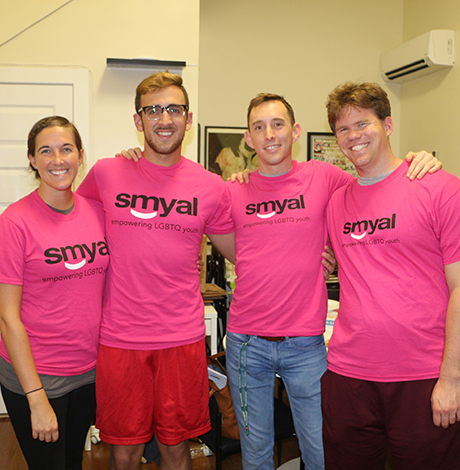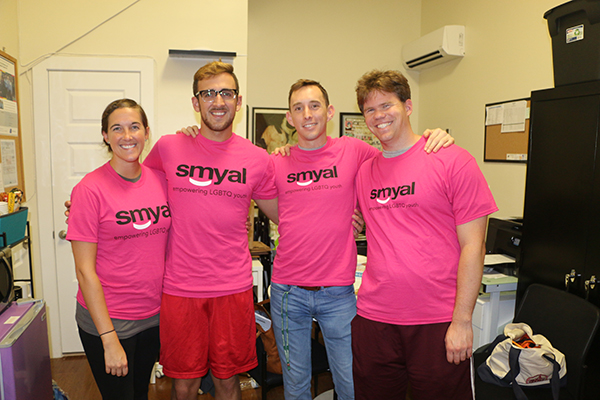Sports
A tradition of giving back
Local LGBT sports teams donate time, money to area groups


Members of Stonewall Kickball volunteering for SMYAL. (Photo courtesy Stonewall Kickball)
If you look deeper into the activities of the LGBT sports teams in Washington, you’ll find that they’re all donating money to local and national nonprofits. Just a few examples would be the long history of giving by the D.C. Front Runners, D.C. Aquatics Club, Stonewall Sports and the Federal Triangles Soccer Club.
One thing that might not be as well known is that the LGBT sports teams are also showing up in person to engage in hands-on work with nonprofits. The importance of the work they are doing isn’t lost on either side.
“We put our volunteers through orientation which includes a look at our facets of service along with gender and sexuality training,” says Sarah Beasley, director of operations and volunteer coordinator at SMYAL. “The training helps to foster a vested interest in our organization.”
Since its inception in 2010, Stonewall Kickball has been working in the community with organizations such as Friends of Stead Park and Whitman Walker. Recently they volunteered to put new furniture together at SMYAL’s transitional house for homeless LGBT youth.
“It was the first time that I had worked directly with the LGBT community and it was a great experience,” says Nick Jordan of Stonewall Kickball. “We ended up going back a second time to finish up the work.”
The experience led to Stonewall Kickball volunteering at the SMYAL Fall Brunch where they set up floral arrangements.
“Compared to just giving money, it’s really important for us to be involved in the community. A lot of people join the leagues because they are disconnected,” Jordan says. “This is a stepping stone to becoming connected to the other aspects of what makes up our community.”
One of the goals of Anthony Scheller’s presidency of the Washington Scandals RFC has been to address more philanthropy. Through his employer, Booz Allen Hamilton, 10 rugby players signed up to volunteer for National Rebuilding Day.
“We went to the home of a 91-year-old woman who was having trouble getting around,” Scheller says. “We installed handrails, elevated toilet seats, painted, cleaned, poured concrete, repaired her fence and installed smoke detectors.”
The Scandals have also been up to Stoystown, Pa., where they washed windows at the Flight 93 National Memorial. Gay rugby player Mark Bingham died on the flight in the 9-11 terrorist attacks.
“This work has been important for our team because it gives us the opportunity to accomplish something together that goes beyond our original mission statement,” Scheller says. “This is work we will continue to do in the future.”
In each of the last six seasons, the D.C. Gay Flag Football League has taken a weekend off for what they call their day of service. The four league conferences break apart with each one doing different work in the community.
“Our players are mostly affluent working professionals who are helping to bridge entirely different communities,” says Brian Hotchkiss, commissioner of the D.C. Gay Flag Football League.
Their work includes clothing drives along with repairs and maintenance at Casa Ruby, Food & Friends service and football clinics and park restoration at Edgewood Park.
“As opposed to giving money, there is something exponentially different in interfacing with someone who is benefitting from what you are doing,” Hotchkiss says. “You are more likely to give back if you have a connection. These days of service allow that connection.”
Sports
Attitude! French ice dancers nail ‘Vogue’ routine
Cizeron and Fournier Beaudry strike a pose in memorable Olympics performance

Madonna’s presence is being felt at the Olympic Games in Italy.
Guillaume Cizeron and his rhythm ice dancing partner Laurence Fournier Beaudry of France performed a flawless skate to Madonna’s “Vogue” and “Rescue Me” on Monday.
The duo scored an impressive 90.18 for their effort, the best score of the night.
“We’ve been working hard the whole season to get over 90, so it was nice to see the score on the screen,” Fournier Beaudry told Olympics.com. “But first of all, just coming out off the ice, we were very happy about what we delivered and the pleasure we had out there. With the energy of the crowd, it was really amazing.”
Watch the routine on YouTube here.
Italy
Olympics Pride House ‘really important for the community’
Italy lags behind other European countries in terms of LGBTQ rights

The four Italian advocacy groups behind the Milan Cortina Winter Olympics’ Pride House hope to use the games to highlight the lack of LGBTQ rights in their country.
Arcigay, CIG Arcigay Milano, Milano Pride, and Pride Sport Milano organized the Pride House that is located in Milan’s MEET Digital Culture Center. The Washington Blade on Feb. 5 interviewed Pride House Project Manager Joseph Naklé.
Naklé in 2020 founded Peacox Basket Milano, Italy’s only LGBTQ basketball team. He also carried the Olympic torch through Milan shortly before he spoke with the Blade. (“Heated Rivalry” stars Hudson Williams and Connor Storrie last month participated in the torch relay in Feltre, a town in Italy’s Veneto region.)
Naklé said the promotion of LGBTQ rights in Italy is “actually our main objective.”
ILGA-Europe in its Rainbow Map 2025 notes same-sex couples lack full marriage rights in Italy, and the country’s hate crimes law does not include sexual orientation or gender identity. Italy does ban discrimination based on sexual orientation in employment, but the country’s nondiscrimination laws do not include gender identity.
ILGA-Europe has made the following recommendations “in order to improve the legal and policy situation of LGBTI people in Italy.”
• Marriage equality for same-sex couples
• Depathologization of trans identities
• Automatic co-parent recognition available for all couples
“We are not really known to be the most openly LGBT-friendly country,” Naklé told the Blade. “That’s why it (Pride House) was really important for the community.”
“We want to use the Olympic games — because there is a big media attention — and we want to use this media attention to raise the voice,” he added.

Naklé noted Pride House will host “talks and roundtables every night” during the games that will focus on a variety of topics that include transgender and nonbinary people in sports and AI. Another will focus on what Naklé described to the Blade as “the importance of political movements now to fight for our rights, especially in places such as Italy or the U.S. where we are going backwards, and not forwards.”
Seven LGBTQ Olympians — Italian swimmer Alex Di Giorgio, Canadian ice dancers Paul Poirier and Kaitlyn Weaver, Canadian figure skater Eric Radford, Spanish figure skater Javier Raya, Scottish ice dancer Lewis Gibson, and Irish field hockey and cricket player Nikki Symmons — are scheduled to participate in Pride House’s Out and Proud event on Feb. 14.
Pride House Los Angeles – West Hollywood representatives are expected to speak at Pride House on Feb. 21.
The event will include a screening of Mariano Furlani’s documentary about Pride House and LGBTQ inclusion in sports. The MiX International LGBTQ+ Film and Queer Culture Festival will screen later this year in Milan. Pride House Los Angeles – West Hollywood is also planning to show the film during the 2028 Summer Olympics.
Naklé also noted Pride House has launched an initiative that allows LGBTQ sports teams to partner with teams whose members are either migrants from African and Islamic countries or people with disabilities.
“The objective is to show that sports is the bridge between these communities,” he said.
Bisexual US skier wins gold
Naklé spoke with the Blade a day before the games opened. The Milan Cortina Winter Olympics will close on Feb. 22.
More than 40 openly LGBTQ athletes are competing in the games.
Breezy Johnson, an American alpine skier who identifies as bisexual, on Sunday won a gold medal in the women’s downhill. Amber Glenn, who identifies as bisexual and pansexual, on the same day helped the U.S. win a gold medal in team figure skating.
Glenn said she received threats on social media after she told reporters during a pre-Olympics press conference that LGBTQ Americans are having a “hard time” with the Trump-Vance administration in the White House. The Associated Press notes Glenn wore a Pride pin on her jacket during Sunday’s medal ceremony.
“I was disappointed because I’ve never had so many people wish me harm before, just for being me and speaking about being decent — human rights and decency,” said Glenn, according to the AP. “So that was really disappointing, and I do think it kind of lowered that excitement for this.”
Puerto Rico
Bad Bunny shares Super Bowl stage with Ricky Martin, Lady Gaga
Puerto Rican activist celebrates half time show

Bad Bunny on Sunday shared the stage with Ricky Martin and Lady Gaga at the Super Bowl halftime show in Santa Clara, Calif.
Martin came out as gay in 2010. Gaga, who headlined the 2017 Super Bowl halftime show, is bisexual. Bad Bunny has championed LGBTQ rights in his native Puerto Rico and elsewhere.
“Not only was a sophisticated political statement, but it was a celebration of who we are as Puerto Ricans,” Pedro Julio Serrano, president of the LGBTQ+ Federation of Puerto Rico, told the Washington Blade on Monday. “That includes us as LGBTQ+ people by including a ground-breaking superstar and legend, Ricky Martin singing an anti-colonial anthem and showcasing Young Miko, an up-and-coming star at La Casita. And, of course, having queer icon Lady Gaga sing salsa was the cherry on the top.”
La Casita is a house that Bad Bunny included in his residency in San Juan, the Puerto Rican capital, last year. He recreated it during the halftime show.
“His performance brought us together as Puerto Ricans, as Latin Americans, as Americans (from the Americas) and as human beings,” said Serrano. “He embraced his own words by showcasing, through his performance, that the ‘only thing more powerful than hate is love.’”
-

 Canada5 days ago
Canada5 days agoShooter who killed 7 people inside Canada school was transgender
-

 Russia5 days ago
Russia5 days agoRussia’s anti-LGBTQ crackdown takes absurd turn
-

 Health5 days ago
Health5 days agoCMS moves to expand HIV-positive organ transplants
-

 State Department4 days ago
State Department4 days agoFOIA lawsuit filed against State Department for PEPFAR records




















